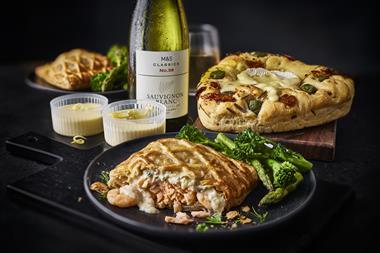Tesco is at the centre of a row over its fresh produce price-cuts pledge that is threatening to grow into a much wider debate over retail promotions.
Cornwall Trading Standards officer Martin Fisher is calling for wholesale change to the rules to make it harder for grocers and high street retailers to claim they have slashed prices. "People have never really understood how limited the price cuts really are," he says.
He sounded his concerns last weekend when he branded elements of Tesco's year-long Fruit and Veg Pledge as "gross exploitation" of the rules on price indications.
The multiple's high-profile campaign promises to halve the price of five produce lines each week. However, figures circulated by a competitor appear to show that some prices actually rose sharply in December before being halved in January.
Tesco robustly defended itself this week, dismissing some of the price data as inaccurate and also pointing out that prices are always volatile in December, when fruit supplies switch from the northern hemisphere to the southern.
But it did accept that it has been using a 'double crossout' promotion, where the price of a product is reduced in steps.
Thus a 500g punnet of peaches cost £2.99 on 26 November before the price fell to £1.99 on 3 December and finally to £1.49 on 7 January for the half-price offer.
The discount relative to the November price is indeed 50%, but only 25% compared with the most recent price charged.
"It isn't disallowed, but it's clever," says Fisher, who claims the practice is common in all retailers and abuses the spirit of the Code of Practice for Traders on Price Indications.
By exploiting a loophole for fresh produce that is nearing its sell-by date and needs to be cleared quickly, grocers avoid the need to 'establish' the higher price for 28 consecutive days before making a cut, as they would do with other products, says Fisher.
A Tesco spokesman says the offers weren't misleading because products were always clearly marked. He adds that customers would lose out if prices were not cut in stages.
"The important thing is to pass on price cuts as soon as we can, and if that means double crossouts, so be it," he says. "It's a reflection of the seasonality of produce. Sometimes we can cut prices more than we at first thought."
He also rejects the suggestions shoppers are confused by the mechanism, which Tesco and other big grocers claim is in line with legislation.
The practice first came to the attention of Trading Standards officers in summer 2005, when it was used extensively to promote British summer fruit.
Now Fisher is lobbying the DT to close the loophole, but he says progress is slow.
He adds that the problem extends beyond fresh produce and he disputes the validity of the 28-day price establishment rule, pointing to numerous examples where other retailers have been hauled before Trading Standards.
One recent example concerned high-street fashion chain The Officers Club, which was found guilty of misleading shoppers with a 70%-off deal on a suit. The retailer came unstuck in court because the higher price for the suit was not offered in enough stores.
"They stuck to the letter, but not the spirit of the law," says partner Fiona Carter at Browne Jacobson. "It is a fine line between legitimate marketing and misleading people into spending their money."
Prosecutions are costly and often appear quite random, she adds. "Prosecution depends on whether you've got a vociferous complainant. If you take the example of Tesco, you know half your budget as a Trading Standards officer is going to go into any court case."
However, in December, the EU's Unfair Commercial Practices Directive is due to be drafted into English and Scottish law and should make it easier to prosecute for misleading labelling by moving cases to the civil courts.
Both Fisher and Carter say it could make prosecutions faster and cheaper, as long as there is the funding to support an increase in case volumes.
And in the long run, adds Fisher, there is the prospect of European-style restrictions on sale discounting coming to the UK through EU case law.
He points to the possibility of French-style restrictions on major sales to just January and July.n
Fresh Foods, p62



















No comments yet